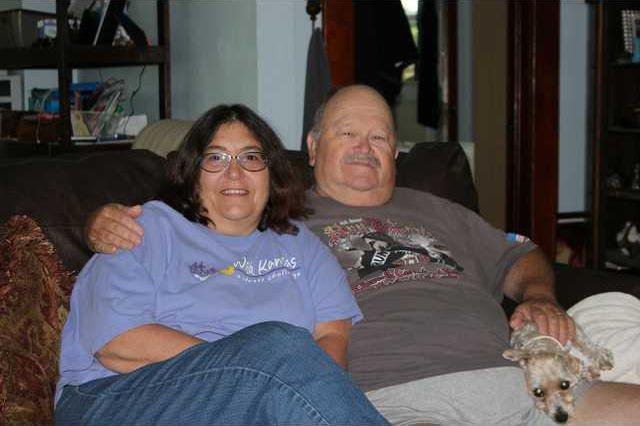Many people would balk at the prospect of a half dozen teenaged boys roaming about under their roof. Just the logistical challenge of feeding them would test the resolve of most. Others, however, relish the challenge – like Berge and Sharon Cox, retired corrections officers uniquely suited for managing a household full of adolescent boys.
Licensed foster parents since 2011, the Holyrood couple was recently named Saint Francis Community Services Foster Family of the Year for 2013. Ozzy and Harriet they ain’t, but they know how to manage rowdy boys, and they do it with humor, perseverance, and a commitment to fairness.
Sharon brushes off any reference to her pluck, though, with the wave of a hand.
“I know what I’m doing,” she says. “I’ve kept my toddler granddaughter for a few days, and she will trash a house in a heartbeat. Not only that, but there are diapers to change and you have to know where she is constantly. That takes real effort; I can’t just let her go to the park and shoot baskets.”
Together about 18 years, the two head a bona fide blended family, comprised of five biological children, two adopted sons, and three foster boys. Of the biological children, only the youngest, Zachary, remains in the home. He’s 18-years-old and shares the house with his two adopted brothers, Anthony, 17, and Trey, 16, and three foster youth, ages 17, 12, and 10.
Sharon, a unit team manager, thought about fostering for several years leading up to her early retirement from the Ellsworth Correctional Facility (ECF).
She says, growing up, her family was “kind of messed up,” and all four of her siblings ultimately ran away from home. Two ended up in foster care. She struggled with her own issues, too, but eventually went to college and earned a degree in social work.
“I guess I’m a caregiver,” she says. “At the prison, I worked with adult males, and I could be hard on them. But I was also a good listener and interested in people. One of the reasons I retired was because I started becoming emotionally invested in the inmates, and you just can’t do that.”
Berge, a shift supervisor, retired from ECF a year before Sharon; she left in May of 2010. That same month, they started MAPP classes.
Recently retired, Berge, however, had reservations about such an undertaking.
“I was somewhat reluctant, but I figured we’d check it out and see what it was all about,” he said. “Ultimately, I’m glad we got into it. For one thing, there are a lot of kids out there that need help, and it’s a way to give back.”
They teach independent living skills to the boys through a generous monthly allowance they distribute equally. Each boy uses his allowance to purchase school supplies, shoes, clothing, and other items. The exercise teaches the boys to distinguish between wants and needs.
Sharon says the boys do nothing to “earn” their allowance.
“You should have certain things just because you exist. I’m not necessarily into rule enforcement; I’m into the relationship. If you respect me, I’ll respect you.
“Besides, everybody needs to have some money in his pocket, and I think one of the problems for foster kids is that they feel like they’re so dependent upon everyone else’s goodwill for every little thing – even a candy bar. That can be bad for a person’s self-esteem, and in our society, having a couple dollars in your pocket has a lot to do with self-esteem.”
Berge turns 68 this year and collects Social Security; they both have pensions. Sharon says it would be easy to quit now and enjoy retirement - take a break from dental and doctor appointments, baseball games, driver’s ed classes. They’ve fostered for four years. Any day, they could call it quits and no one would think worse of them.
Sharon, however, doesn’t feel like she’s done. Besides, as she reminds Berge, what would they do?
“Let’s face it; we’re far from perfect parents. We’re not like, On … The … Ball. We get by. But these are teenaged boys. They know where the breakfast cereal is, and they know how to fix a sandwich for lunch. At dinner, we put out a meal and they can eat it or not. I’m good either way. If you don’t like what we’re serving, there’s sandwich stuff in the fridge.
“Kids are what they are, and foster kids aren’t any different than other kids. They just have some issues. Some people have this idea, like they do about inmates. A person could live next door to them for 20 years, and they think he’s a perfectly great guy until they find out he was an inmate. Suddenly, their whole perception changes. The guy didn’t change, just their perception. Some people feel the same about foster kids. It’s bull, but they believe it.
“I don’t mean to sound all sappy and say our foster kids are just like our own kids, but when they’re here, they are our family. They are part of it. This is our home, and we’re all invested in it.”
St. Francis Community Services Foster Family of the Year





